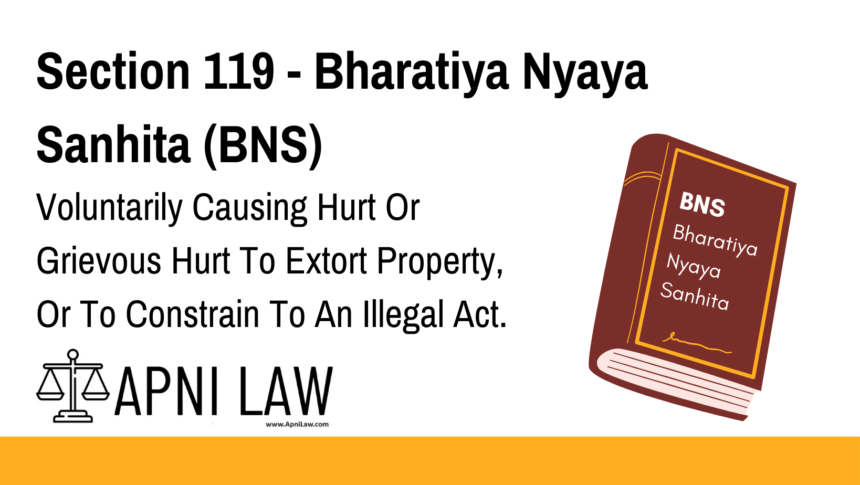Code:Section 119 BNS
(1) Whoever voluntarily causes hurt for the purpose of extorting from the sufferer,
or from any person interested in the sufferer, any property or valuable security, or of
constraining the sufferer or any person interested in such sufferer to do anything which is
illegal or which may facilitate the commission of an offence, shall be punished with
imprisonment of either description for a term which may extend to ten years, and shall also be
liable to fine.
(2) Whoever voluntarily causes grievous hurt for any purpose referred to in
sub-section (1), shall be punished with imprisonment for life, or imprisonment of either
description for a term which may extend to ten years, and shall also be liable to fine.
Explanation of Section 119 BNS
Section 119 of the Bharatiya Nyaya Sanhita (BNS) addresses cases where an individual intentionally causes hurt or grievous hurt to extort money, property, or to force someone into committing an illegal act. This provision ensures strict punishment to deter individuals from using force or violence as a means of coercion.
Key Provisions:
- Hurt for Extortion – If a person causes physical harm to force the victim into handing over money, property, or security, they can face severe legal consequences.
- Grievous Hurt for Extortion – If the harm caused is severe (grievous hurt), the punishment can extend to life imprisonment.
- Scope of the Law – The offense applies to both direct victims and individuals related to the victim who might be targeted.
- Mandatory Punishment – The law prescribes strict imprisonment terms, ensuring deterrence against such crimes.
Illustration
Example 1: Extortion by Violence
Ravi, a local gangster, assaults a shopkeeper and threatens further harm unless the shopkeeper pays a protection fee. This falls under Section 119(1) BNS, making Ravi liable for imprisonment up to 10 years along with a fine.
Example 2: Grievous Hurt for Illegal Purpose
A criminal gang kidnaps a businessman and tortures him until he signs over property documents. Since the businessman suffers grievous hurt, the offenders can be punished under Section 119(2) BNS, facing life imprisonment or up to 10 years in prison with a fine.
Common Questions and Answers on Section 119 BNS
1. What is the difference between “hurt” and “grievous hurt” under Section 119?
- “Hurt” refers to any physical pain, injury, or illness caused to a person.
- “Grievous hurt” includes serious injuries such as fractures, disfigurement, or injuries endangering life.
2. What is the maximum punishment under Section 119?
- If hurt is caused, the punishment is up to 10 years imprisonment with a fine.
- If grievous hurt is caused, the punishment extends to life imprisonment or up to 10 years imprisonment with a fine.
3. Does the law cover threats or only actual physical harm?
Section 119 applies only if actual hurt or grievous hurt is inflicted. However, threats without physical harm may be covered under criminal intimidation laws.
4. Can an accused be granted bail under Section 119 BNS?
Since grievous hurt cases under Section 119(2) are punishable with life imprisonment, bail is generally difficult and depends on court discretion.
5. How does this section differ from robbery or dacoity laws?
Robbery and dacoity involve forcible taking of property, while Section 119 deals with coercion through hurt to extort property or compel an illegal act.
Conclusion
Section 119 BNS is a stringent law that penalizes individuals who cause harm to extort property or force others into illegal acts. By prescribing harsh imprisonment terms and fines, this law plays a critical role in preventing violent extortion and protecting individuals from undue coercion.
For more legal insights, visit ApniLaw 🚀.








